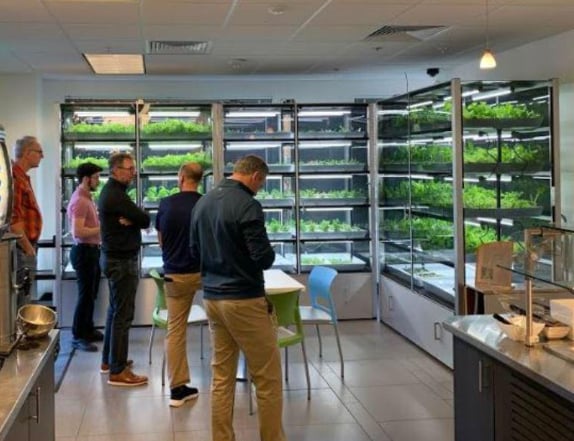June 20, 2025 | 16:56 GMT +7
June 20, 2025 | 16:56 GMT +7
Hotline: 0913.378.918
June 20, 2025 | 16:56 GMT +7
Hotline: 0913.378.918

A microfarm installation creates farm-to-salad-bar food.
Photo: BABYLON MICROFARMS
“Up to 60 percent of fresh produce is wasted before it reaches the consumer’s plate,” says Alexander Olsen, CEO and Co-founder of Babylon Micro-Farms, a small sustainable agriculture start-up located in Richmond, Va.
The problem of food waste was something that Olsen and his co-founder and Chief Technical Officer, Graham Smith, came across when they were students at University of Virginia. Olsen and Smith had set out to build hydroponics systems in refugee camps to help mitigate food shortage issues within the camps, but their idea was greeted with a much stronger interest from a broader market.
“We saw an opportunity to develop small on-site farming systems that could help businesses, communities, and consumers grow food on-site and eliminate the supply chain,” says Olsen, “What would the world look like if everyone had the ability to grow their own food?”
So in April of 2017 they incorporated and began testing models to serve a larger market.
“I think the thing that is special that we do is that it’s really soup to nuts, it’s totally integrated,” says Smith. “Whereas there are other companies in the vertical farming and hydroponic farming space that do one segment of the total technology chain or the service, we’re really a one stop shop. You don’t need to learn how to put together PVC piping to get a farm running. You don’t need to learn how to dose nutrients or pH or set up the lighting and irrigation schedule. You come to us for the hardware but we also have the software that underpins that technology. And we’re constantly collecting all the data so we know exactly how everything is going and we tweak the variables to make sure it’s always running smoothly.”
Their farming operation is controlled remotely through their proprietary software, that has an easy to navigate app where users can see the progress of their plants and know when to harvest them.
And because the company uses hydroponics to farm, meaning that they don’t use soil and the water is recycled through the system, their food grows with significantly less water than traditional farms.
“By dissolving the nutrients in water, it’s like an IV drip. The plant gets exactly what it needs at any one time, and the water recirculates, so it’s up to 90 percent less water than growing plants outdoors,” says Olsen.
“We’re building a bridge toward a more mainstream consumer market and allowing businesses and people who don’t want to be farmers and who don’t want all of that learning to have a turnkey experience,” says Olsen. “Our units today take around 30 minutes a week to operate and we’re remotely controlling all the complex scientific aspects of growing, and in doing so we make it really effortless. Our goal is to remove the green thumb from growing and we’ve achieved that.”
One of those units is in located in the cafeteria of the Commonwealth Senior Living facility in Gloucester, Va., where Chef Andre Smith uses the farm to bring fresh new plates to the residents of the house.
“The Babylon produce has really expanded our horizons, especially when we’re growing basil. Our Italian dishes pop now because we’re going into the Babylon farm and we’re picking basil and we’re putting it onto the dish,” Chef Smith says, “and we’re educating the residents at the same time.”
The farms currently yield about 8 pounds of leafy greens per week. And Olsen and Smith say that they aren’t trying to put traditional farms out of business, but rather tackle a niche of consumers who want to have access to a much higher quality and fresher product. “We are part of the solution but not the solution, and I think indoor agriculture broadly as an industry is something that fosters a lot of positive change,” says Olsen.
Babylon Micro-Farms has orders across 29 states and expects to have thousands of Micro-Farms installed within the next couple of years.
(The Hill)

(VAN) Poultry production in Poland, which has only started recovering from devastating bird flu outbreaks earlier this year, has been hit by a series of outbreaks of Newcastle disease, with the veterinary situation deteriorating rapidly.

(VAN) Extensive licensing requirements raise concerns about intellectual property theft.

(VAN) As of Friday, a salmonella outbreak linked to a California egg producer had sickened at least 79 people. Of the infected people, 21 hospitalizations were reported, U.S. health officials said.

(VAN) With the war ongoing, many Ukrainian farmers and rural farming families face limited access to their land due to mines and lack the financial resources to purchase needed agricultural inputs.

(VAN) Vikas Rambal has quietly built a $5 billion business empire in manufacturing, property and solar, and catapulted onto the Rich List.

(VAN) Available cropland now at less than five percent, according to latest geospatial assessment from FAO and UNOSAT.

(VAN) Alt Carbon has raised $12 million in a seed round as it plans to scale its carbon dioxide removal work in the South Asian nation.